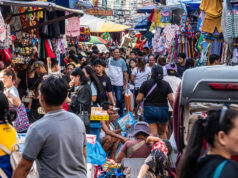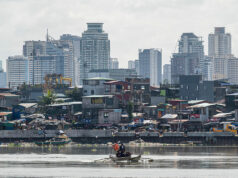International art fairs go online amidst virus outbreak
By Michelle Anne P. Soliman, Reporter
WHEN COVID-19 started to spread across the globe early this year, big public events in the arts industry were either postponed or canceled. As much of the world went under quarantine, the arts moved online with performers, musicians, theater and entertainment companies offering shows via streaming. This led international art fairs, such as this year’s edition of Art Basel Hong Kong and Art Dubai, to cancel the physical fairs but to push through via their respective virtual viewing platforms.
VIRTUAL ENGAGEMENT
After canceling its scheduled fair at the Hong Kong Convention Centre on March 19 to 21, the 8th edition of Art Basel Hong Kong launched its Online Viewing Rooms which were open from March 20 to 25. The Online Viewing Rooms debuted with an international lineup of 235 leading galleries from 31 countries presenting over 2,000 artworks.
“We have brought forward the launch of the first edition of the Online Viewing Rooms in an effort to provide our Art Basel Hong Kong 2020 exhibitors with an alternative platform and opportunity to showcase the works of art they were planning to bring to Hong Kong at no cost,” Adeline Ooi, Director Asia for Art Basel in Hong Kong, told BusinessWorld in an e-mail.
The pieces in the recently concluded virtual exhibition had an estimated value of $270 million, with 70 items priced at over $1 million.
“As the art market continues to evolve, Art Basel is continually investing into new technologies and opportunities to support its galleries and to foster a healthy art world ecosystem. Art Basel’s Online Viewing Rooms is designed to provide an additional platform for galleries to engage with the highest caliber of audiences worldwide — including Art Basel’s global network of patrons, as well as new collectors and buyers — and promote their artists,” Ms. Ooi wrote.
Meanwhile, the 14th edition of Art Dubai — which was originally scheduled to run from March 25 to 28 at the Madinat Jumeirah resort — also launched a digital program on March 24. This year, it’s programs took a total shift to the digital space with the 2020 Online Catalogue of artworks of more than 500 works, a Global Art Forum live broadcast, and an online performance program curated by Marina Fokidis.
RECEPTION TO GOING DIGITAL
Art Basel Hong Kong’s Online Viewing Rooms were attended by more than 250,000 visitors from across the globe within its seven-day duration (including VIP previews). In 2019, it attracted 88,000 visitors.
Despite limitations, Ms. Ooi noted that the online platform received a positive reception.
“While the Online Viewing Rooms cannot replace the physical fair, we received positive feedback from galleries across all levels of the market in terms of sales and the ability to stay connected with existing and new contacts. For small and mid-sized galleries, the platform provided them with the opportunity to explore the concept of an online viewing room, to cultivate new relationships and to generate positive business leads,” Ms. Ooi wrote.
As online viewing explores other methods of viewing art, Ms. Ooi stressed the value of face-to-face interaction. “Collectors don’t come to fairs exclusively to buy work, just as gallerists don’t solely participate to sell the works on display. Both collectors and gallerists attend our shows to exchange ideas, deepen existing relationships, and to develop new connections and new projects. In a market built on trust, face-to-face interaction remains essential.”
In an e-mail to BusinessWorld, International Director of Art Dubai Chloe Vaitsou noted that during the art fair’s first week, “more than 300 sales enquiries were received for individual works with a number of sales confirmed” and that the 2020 Online Catalogue has received “close to three times more traffic compared to 2019, with over 40,000 views” since its launch on March 24.
Likewise, Ms. Vaitsou agreed that the digital fair “cannot fully replace the physical encounter of attending and experiencing an art fair in person.”
“We already had an Online Catalogue ready to be launched so this didn’t prove challenging. Changing the live physical conference format of the Global Art Forum to a live streamlined experience required the application of relevant technologies and a shift in coordination tactics, which we were quick to achieve. The Performance Program organically shifted to online artist projects, with both existing works and new works created to be available publicly through widely used platforms. We are in ongoing discussions to evolve our digital scope, which will require different solutions and approaches,” she wrote.
The Philippines’ Silverlens Galleries, which had participated in previous Art Basel fairs previously, participated in both art fairs’ online iterations. It featured works by Southeast Asian artists Santiago Bose, Patricia Perez Eustaquio, Mit Jai Inn, Gary-Ross Pastrana, Maria Taniguchi, and Yee I-Lann at Art Basel Hong Kong; while Pio Abad, James Clar, and Nicole Coson were featured in Art Dubai.
“We had about the same number of inquiries on both Art Basel and Art Dubai. Confirmed purchases were by clients already familiar with the artists’ works,” Silverlens Galleries co-founder Isa Lorenzo told BusinessWorld in an e-mail, on their participation this year.
In Art Basel’s Online Viewing Room, exact or price ranges per artwork were presented. “Research shows that works online with price information are exponentially more likely to be sold. We have had great feedback from collectors who appreciated the price transparency,” Ms. Ooi wrote.
“The inclusion of prices provides transparency,” Ms. Lorenzo wrote. “In the primary market, it protects the artists from unscrupulous dealers.”
Ms. Lorenzo also noted, however, that the experience of a virtual and actual art fair cannot compare to the real thing as there are “a lot of casual browsers online” and that most of their previous Art Basel Hong Kong sales were made “on the floor with the clients standing in front of the artwork.”
ART FAIRS POST COVID-19
Ms. Ooi and Ms. Vaitsou remains optimistic about the art fair’s future endeavors, despite uncertainties thanks to the situation with the COVID-19 pandemic.
Originally scheduled in June, the 2020 edition of Art Basel has been rescheduled on Sept. 17 to 20, 2020 at the Messe Basel.
“The decision to move the show to September was made in close consultation with a wide range of gallerists, collectors, partners, and external experts. While it is impossible to predict precisely what the situation will be in September, we are currently moving forward with our planning,” Ms. Ooi wrote. “Similarly, we are still planning to host our Miami Beach show from Dec. 3 to 6, 2020.”
Meanwhile, the 15th Art Dubai will be held on March 17 to 20, 2021.
“We have to be realistic about the impact the current situation and the ripple effects it will have globally and across industries. The art market is not immune to this. The majority of cultural events around the world are not going forward which will no doubt have implications to trade and industry as a whole at this moment,” Ms. Viatsou wrote. “However, it is inevitable that there will also be adaptation and we are optimistic that the future will see the art market adjust and continue diversifying and growing.”



